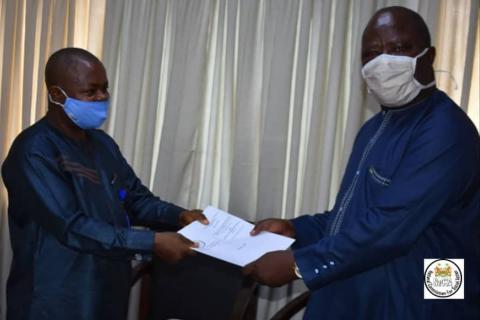By Kemo Cham
The National Commission for Social Action (NaCSA) and the Rokel Commercial Bank have signed an agreement for the implementation of the second phase of the Sierra Leone Government’s Social Safety Net (SSN) project.
The World Bank funded pro-poor project, which is implemented by NaCSA, targets the most vulnerable segment of society who are provided direct cash to ease the effect of poverty on their lives. Rokel, under NaCSA’s Emergency Cash Transfer programme, will make the payment of a total of US$4million directly to the over 30, 000 beneficiaries across the country.
The SSN, which provides income support to extremely poor households, is the World Banks’s way of responding to inequality which has left a huge section of the global population in abject poverty and unable to afford basic needs.
Sierra Leone has implemented the SSN since 2014.
Under the Bio administration, the country first signed the agreement with the Bank in 2019 for US$30million, a grant from the International Development Association (IDA), to finance the project which initially targeted 35,000 beneficiaries in all 16 districts of the country. It was launched by President Julius Maada Bio in early 2020.
This US$4million is an additional financing promised by the president at the launch in Kenema, said to have been set aside for emergency preparedness and response.
The Coronavirus (COVID – 19) pandemic and the consequent declaration of a state of emergency occasioned the need for funding for Emergency Cash Transfers (ECTs) to the vulnerable segment of the population, according to NaCSA.
It said the scheme targets households with informal sector workers including those working in micro and small enterprises and low paid workers in the service sector in the regional headquarters.
“These households are expected to be among those that are especially vulnerable to the immediate and indirect impacts resulting from social distancing and a reduction in employment and income,” the Commission said in a statement obtained by Politico.
The SSN involves three parties: NaCSA, which is the implementing agency; Statistics Sierra Leone, which is responsible to ensure that the deserving beneficiaries are selected for payment; and the Anti-Corruption Commission (ACC) which monitors the process to ensure accountability and provides an avenue for grievance redress.
As the implementing body, NaCSA says it deemed it necessary to make payment via a financial institution to ensure transparency and accountability in the process.
Previously the Commission used the defunct Splash service.
Rokel was selected as service provider for the payment during the implementation of the first phase of this current project.
It could be recalled that a few weeks ago social and mainstream media were inundated with reports of misappropriation of the funds during cash transfers to disable people. The transfer was done by officials of the Commission, which said it did so because of the emergency nature of the situation.
Emmanuel Borbor, Deputy Managing Director of Rokel Commercial Bank, spoke about the “long standing relationship” between the bank and NaCSA, which he said was based on mutual partnership.
“NaCSA is one of the reputable government agencies, working with such institution is not only for profit making but it presents the perfect opportunity to serve our people and as a bank, our customers are at the centre of what we do. The bank stands ready to provide all financial assistance as indicated in the contract,” he was quoted in the statement.
Abu Bockarie Kokofele, Commissioner of NaCSA, said the SSN is one of the government’s mechanisms to alleviate poverty and stressed the need to ensure transparency in its implementation.
“Implementation should have started but considering the essence of transparency and accountability in development, the Commission and its partners have to follow all processes including targeting mechanisms,” he said, adding: “I am particularly happy that we have Rokel Commercial Bank for the second time to disburse the cash to deserving target groups.”
Copyright © 2020 Politico Online








